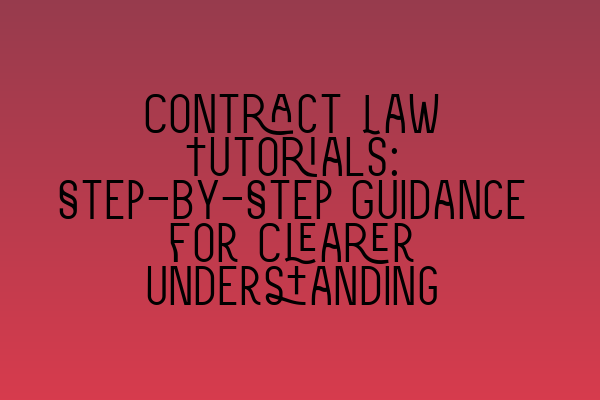Contract Law Tutorials: Step-by-Step Guidance for Clearer Understanding
Welcome to SQE Contract Law! As solicitors, we understand the importance of having a clear understanding of contract law. Contracts are the foundation of many legal transactions, and a solid understanding of this area of law is crucial in providing effective legal advice and representation.
In this blog post, we will provide step-by-step guidance on contract law, breaking down complex concepts into easily understandable terms. Whether you are a law student preparing for the SQE exams or a legal professional looking to refresh your knowledge, our tutorials will help you navigate through this intricate area of law.
The Basics of Contract Law
Let’s start with the basics. A contract is a legally binding agreement between two or more parties. It establishes the rights and obligations of the parties involved and provides a legal framework for enforcing those rights and obligations.
To form a valid contract, four essential elements must be present:
- Offer: One party must make a clear and definite offer to enter into a contract.
- Acceptance: The other party must accept the offer, demonstrating their intention to be bound by the terms of the contract.
- Consideration: Both parties must provide something of value (consideration) in exchange for the promises made in the contract.
- Intention to create legal relations: The parties must intend for the contract to be legally binding.
Understanding these elements is crucial in assessing whether a contract has been formed and in identifying any potential issues or challenges that may arise.
Terms of a Contract
Contracts are made up of terms, which are the rights and obligations agreed upon by the parties. Terms can be express or implied and may be either oral or written.
Express terms are explicitly stated by the parties, either orally or in writing. These terms are the foundation of the contract and form the basis of the parties’ rights and obligations.
Implied terms, on the other hand, are not expressly stated but are implied by law or customary practice. These terms are assumed to be part of the contract based on the nature of the transaction or the conduct of the parties.
Understanding the different types of terms and how they are interpreted is essential in determining the scope of a contract and resolving any potential disputes that may arise.
Breach and Remedies
When one party fails to fulfill their obligations under a contract, it is considered a breach. Breaches can be either material or minor, depending on the significance of the failure to perform.
In the event of a breach, the non-breaching party may seek remedies to address the harm caused. Common remedies include:
- Damages: The non-breaching party may seek monetary compensation for the losses suffered as a result of the breach.
- Specific Performance: In certain cases, a court may order the breaching party to fulfill their obligations as outlined in the contract.
- Rescission: The contract can be canceled, and the parties can be restored to their original positions before entering into the agreement.
Understanding the available remedies and the factors considered by courts in determining appropriate remedies is essential in effectively advising clients and seeking redress for breach of contract.
Further Resources and Exam Preparation
As you dive deeper into the world of contract law, it is crucial to have access to additional resources and practice exams to solidify your understanding and prepare for the SQE exams.
SQE 1 Practice Exam Questions are a valuable tool to test your knowledge and improve your exam performance. These practice questions cover a wide range of contract law topics and allow you to familiarize yourself with the format and structure of the SQE exams.
If you are looking for comprehensive preparation courses, SQE 2 Preparation Courses provide in-depth coverage of all the relevant contract law topics. These courses are designed to help you build a solid foundation of knowledge and develop the skills needed to succeed in the SQE exams.
For a holistic approach to your SQE exam preparation, we also offer SQE 1 Preparation Courses that cover all areas of law tested in the SQE exams, including contract law. These courses provide comprehensive study materials, interactive tutorials, and mock exams to ensure you are fully prepared for the challenges ahead.
Lastly, it is important to stay up to date with the latest SRA SQE Exam Dates to plan your preparation effectively and schedule your exams in a timely manner.
By combining our step-by-step tutorials with additional resources and exam preparation materials, you will be well-equipped to navigate the complexities of contract law and excel in your SQE exams.
At SQE Contract Law, we are dedicated to helping you achieve success in your legal career. With our comprehensive tutorials and extensive exam preparation resources, you can approach contract law with confidence and clarity.
Start your journey towards a deeper understanding of contract law today!
